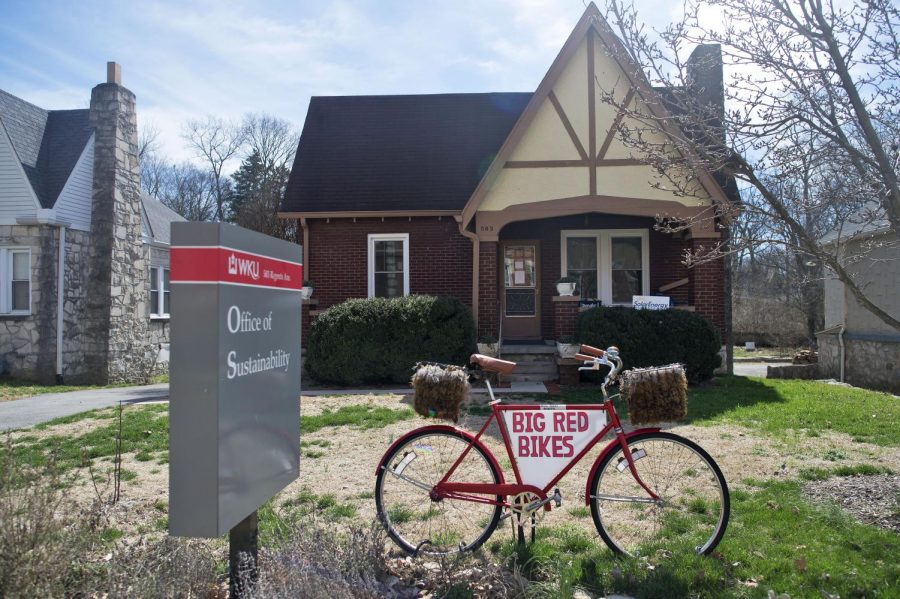WKU joins Kentucky Proud Farm-to-Campus program
March 17, 2015
Fresh vegetables and herbs stood on display outside Fresh Food Company Monday afternoon, and students enjoyed a menu consisting of products from five local farms in celebration of WKU’s initiation into the Kentucky Proud Farm to Campus program.
The Kentucky Commissioner of Agriculture, James Comer presented the acceptance award to President Gary Ransdell at the ceremony in Downing Student Union.
The program partners the university with local farms to purchase their products for use at dining locations on campus.
Comer said the program will positively affect both WKU and the local community.
“This initiative and the steps that WKU, the dining services and Aramark have made today to make a commitment to buy more local food from local family famers is a win-win situation,” Comer said. “It’s a win for family farmers… it’s a win for the local economy… and it’s a win for the student body here at Western.”
Christian Ryan, WKU sustainability coordinator, said the Farm-to-Campus program grew for many years and became a central goal of the sustainability department.
“Fresh food has become a priority for WKU,” she said. “We’ve accomplished a lot, and we have some really great goals.”
This effort toward sustainable food extends to other new practices as well.
Jamie Miller, sustainability coordinator for Aramark, said WKU took several steps toward sustainable food practices and products this semester.
Those steps include the use of eggs from free-range farms, waste-management systems and eco-friendly packaging.
Miller said Burger Studio, Fresh Food Company and Grille Works will utilize cage-free eggs in their cooking. She said this change came as an effort to ensure animals are being treated properly.
Fresh Food Company featured a hydroponic herb garden last semester, an indoor gardening system where plants grew in a water and nutrient solution without soil.
Miller said Fresh Food Company encountered problems with the system and it was taken down this semester, but it will return next fall.
“We’re still learning,” she said. “We’re still working on the proper seeds, the proper nutrients, the proper amount of water to go in the bin and how to keep them protected from outside bugs.”
The chefs at Fresh Food Company picked fresh herbs each day from an outdoor herb garden before the renovation of DSU eliminated that option. Miller said the hydroponic garden was a solution to this.
Miller said Fresh Food Company used the products of the garden at large meals last semester, such as lettuce at Thanksgiving.
“To be able to pull a head of lettuce off, cut it and mix it into the salad blend, that’s really neat,” she said. “That’s as local as you can get.”
Miller said all the kitchens now use clear garbage bins for food trash to manage waste.
“When you can physically see it in the bin, the employees are more apt to make sure their waste isn’t over the top,” she said.
Managers review the bins at the end of each day, weight them and report their findings to Aramark. Miller said the goal is to lessen the amount waste over time to produce a smaller carbon footprint.
Miller she also switched the cups at JuiceBlendz from foam to a more eco-friendly biodegradable cup that is similar to the compostable eco-tainer at Burrito Bowl.
Miller said she used Aramark’s Green Thread Program, the company’s commitment to environmental conservation, as a guideline in developing sustainable options on campus.
“The Green Thread Program has all of our commitments to being more green and more sustainable in all things,” she said.
Miller said a “green team” meets once a month to discuss sustainable practices.
In the future, Miller hopes to eliminate the use of bags at Subway and to sell the gallon buckets used at dining locations to the grounds crew at WKU and donate the money to local charities.
Miller said the sustainability program will continue to grow.
“I love doing the sustainability stuff and being able to affect something,” she said. “We’re going to keep growing and finding ways to expand it as we go along.”






















![Students cheer for Senator at Large Jaden Marshall after being announced as the Intercultural Student Engagement Center Senator for the 24th Senate on Wednesday, April 17 in the Senate Chamber in DSU. Ive done everything in my power, Ive said it 100 times, to be for the students, Marshall said. So, not only to win, but to hear that reaction for me by the other students is just something that shows people actually care about me [and] really support me.](https://wkuherald.com/wp-content/uploads/2024/04/jadenmarshall-600x422.jpg)

